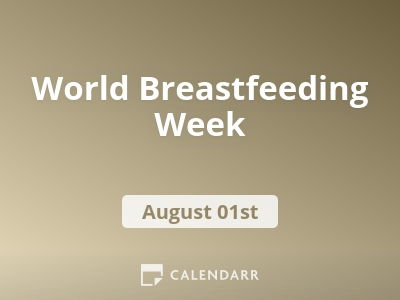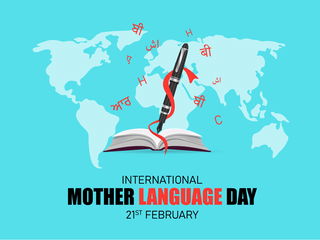- Calendar
- Calendar 2026
- August
- World Breastfeeding Week
World Breastfeeding Week
World Breastfeeding Week is an annual global campaign celebrated from August 1 to 7 in more than 120 countries.
It aims to raise awareness about the importance of breastfeeding for the health and well-being of babies, mothers, and society at large.
It is led by the World Alliance for Breastfeeding Action (WABA), along with the World Health Organization (WHO) and UNICEF.
World Breastfeeding Week promotes exclusive breastfeeding for the first six months, and continued breastfeeding with solid foods for up to two years or more.
This week-long initiative is more than just a health campaign, it’s a movement toward ensuring a strong start in life for every child and promoting healthier communities.
The Origins of World Breastfeeding Week
World Breastfeeding Week was first celebrated in 1992. It began after the Innocenti Declaration was created by WHO and UNICEF in August 1990.
This declaration highlighted the need to protect, promote, and support breastfeeding as a basic right for both mothers and children.
The World Alliance for Breastfeeding Action was formed on February 14, 1991. Its goal was to bring back a global culture that supports breastfeeding.
Since then, World Breastfeeding Week has become a major international event. Governments, health professionals, organizations, and families from around the world now take part in the celebration each year.
The Benefits of Breastfeeding
- Breast milk provides the perfect balance of nutrients needed for a baby’s growth and development.
- It boosts the baby's immune system by supplying natural antibodies. Breastfed babies are less likely to develop infections like diarrhea, pneumonia, and ear infections.
- It reduces the risk of long-term health issues such as obesity, asthma, and type 2 diabetes.
- Breastfeeding helps control bleeding after childbirth by promoting uterine contractions.
- It supports quicker physical recovery and strengthens the emotional bond between mother and child.
- Women who breastfeed have a lower chance of developing breast and ovarian cancer.
- It can delay the return of menstruation, helping naturally space out pregnancies.
- Fewer illnesses in babies reduce the need for medical care, cutting down healthcare costs.
- Breastfeeding has no packaging or waste, making it more eco-friendly than formula feeding.
Themes
Every year, World Breastfeeding Week highlights a specific theme to emphasize different important aspects of breastfeeding…
The theme for World Breastfeeding Week 2025 is 'Invest in Breastfeeding, Invest in the Future.
Themes have included support systems, workplace challenges, environmental impact, and public policy.
For instance, in 2010 alone, more than 540 events were organized across 79 countries, engaging over 400,000 participants and involving nearly 500 organizations.
This demonstrates the growing commitment of global communities to improving child health through breastfeeding.
Challenges of Breastfeeding
- Lack of proper information and support from healthcare providers
- Aggressive marketing of infant formula
- Social stigma and cultural taboos
- Insufficient maternity leave policies
- Lack of breastfeeding-friendly workplaces and public spaces
The Role of Health Professionals and Governments
Healthcare professionals play a critical role in promoting breastfeeding. Proper training ensures they can provide accurate advice, encouragement, and hands-on support to new mothers.
Governments play a crucial role in supporting breastfeeding by enforcing the International Code of Marketing of Breast-milk Substitutes, implementing and monitoring baby-friendly hospital initiatives, ensuring paid maternity leave and lactation breaks at workplaces, and promoting awareness through public health campaigns.
Observing World Breastfeeding Week
World Breastfeeding Week is best observed through a combination of advocacy, education, and community support. Individuals and organizations alike can participate by raising awareness about the importance of breastfeeding through seminars, webinars, social media campaigns, and educational programs.
Healthcare professionals can take this opportunity to provide accurate information and counseling services to expecting and new mothers, highlighting the long-term benefits of breastfeeding for both child and mother.
Employers and policymakers can contribute by reviewing and strengthening workplace policies that support nursing mothers, such as providing paid maternity leave, flexible work arrangements, and designated lactation spaces.
Community leaders and institutions can also play a vital role by creating supportive environments where breastfeeding is normalized and respected in both public and private settings.
On a personal level, families and friends can offer emotional encouragement and practical assistance to breastfeeding mothers.
This could include helping with household tasks, ensuring the mother has adequate rest, and creating a stress-free environment to support successful breastfeeding.
Ultimately, observing World Breastfeeding Week means taking active steps to remove barriers, promote informed choices, and ensure that breastfeeding is protected, promoted, and supported at every level of society.
Recommended Articles

Other Celebrations
-
Mar 15 SunNational Poison Prevention Week
-
Apr 07 Tue
-
Sep 01 TueNational Nutrition Week
-
Sep 27 Sun
-
Oct 01 Thu
-
Oct 05 Mon

World Breastfeeding Week - Next years
Sunday, 01 August 2027
Tuesday, 01 August 2028
Wednesday, 01 August 2029











